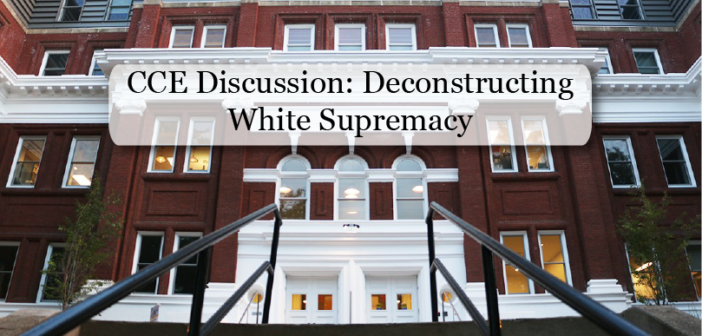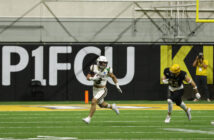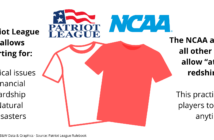Last month’s events in Charlottesville, Virginia, brought the issue of white supremacy to the forefront of political conversations. In response, the Center for Community Engagement is hosting a four-part series titled “Deconstructing White Supremacy.” The first discussion was held Monday in the Williams Global Commons.
Second-year graduate student Frangy Pozo, who is the graduate assistant for the Center of Community Engagement, created the series to allow students to openly discuss hidden white supremacy at Lehigh. In addition to topics relating to race, other types of social identities like gender and sexual orientation were discussed at the meeting. Sixty-five students attended the first session of the series, some as a part of a class and some of their own will.
Each part of the series will be hosted in collaboration with a different department or center. The first session, titled “Deconstructing White Supremacy and You,” was co-hosted by Chelsea Fullerton, the director of the Pride Center, and Scott Burden, the assistant director.
Pozo said her goal is to start a conversation about white supremacy and educate Lehigh’s campus on how, whether people recognize it or not, white supremacy and racism are everywhere.
“It’s (about) beginning to have people first recognize that white supremacy exists, then be able to define it,” Pozo said. “See how it applies in their own lives, and also begin to change the understanding of what normalization looks like. That’s an overall goal that is far and distant in the future.”
Two sets of packets were distributed to each person. The first one, which asked students about their social identities, was to be completed before the workshop began. Everyone was encouraged to discuss their answers with the people they sat with. This introduced the discussion about how everyone identifies with certain traits in society.
Later in the discussion, everyone wrote traits they identified with and then met in groups with people who shared the same identities. These discussions were personal, as everyone was asked to consider the idea of white supremacy and reflect on how it relates to them.
The discussion was extremely productive and resonated with many students who attended. Lauren Fosbenner, ’18, heard about the event through her involvement with the Pride Center. She said she thought it was interesting to see how her peers thought about white supremacy and racism, especially at Lehigh.
“We really need to do more about figuring out ways to combat it because everyone can identify the problems, but no one knows what to do about it after,” Fosbenner said.
John Wlazlo, ’19, said the first discussion of the series allowed for students to openly talk about white supremacy issues.
“Nothing can get done unless people talk about it,” Wlazlo said, “so this event made it possible for people to open up.”
At the end of the discussion, the group brainstormed ways in which the Lehigh community can combat these issues on campus. They also came up with questions that people are still confused about to facilitate more discussion in the future.
Pozo encouraged people to attend the next three parts of the series to continue the conversation about how about white supremacy is present in our everyday lives.
“Have an open mind and realize that we aren’t judgmental, and we aren’t expecting people to have any specific ideas or ideologies coming into this space,” Pozo said. “It’s more (about) how are we willing to assess white superiority together as a Lehigh community, whether that’s students, faculty, staff, etc.”






Comment policy
Comments posted to The Brown and White website are reviewed by a moderator before being approved. Incendiary speech or harassing language, including comments targeted at individuals, may be deemed unacceptable and not published. Spam and other soliciting will also be declined.
The Brown and White also reserves the right to not publish entirely anonymous comments.